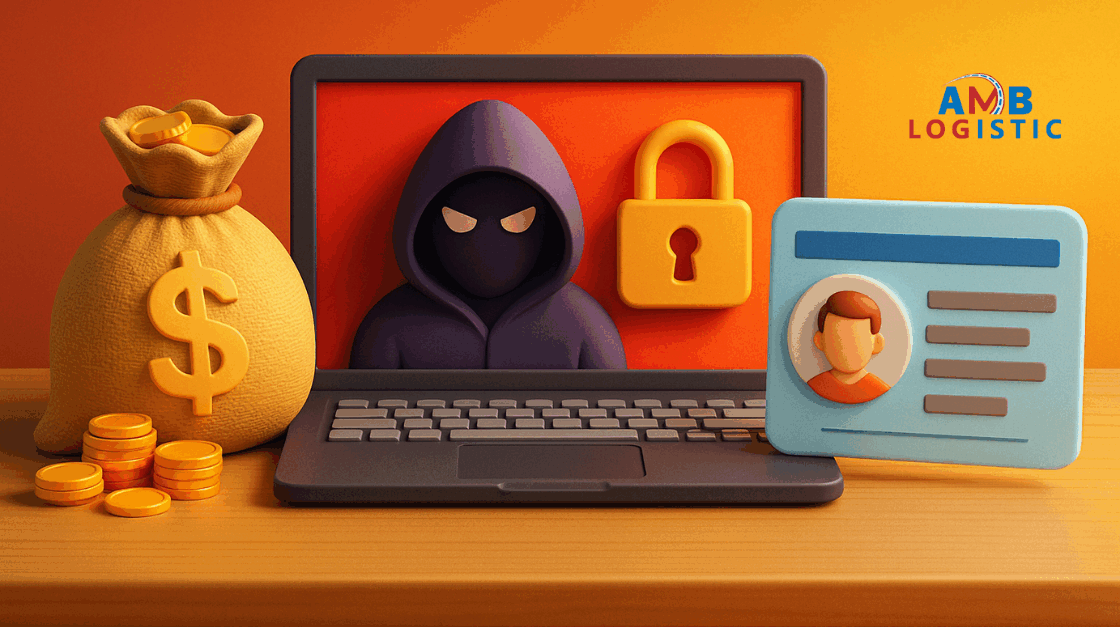
In the world of logistics, precision matters. But in 2025, what’s breaking the freight industry isn’t a delayed delivery—it’s something far more dangerous: identity theft. This isn’t your average cybercrime. It’s freight brokers and carriers being digitally cloned, their reputations used to steal loads, hijack freight, and vanish into thin air. Welcome to the era of phantom carriers, where your MC number might be the key to a $300,000 truckload of copper—that never arrives.
So what exactly is going on behind the scenes? Let’s break it down.
The Rise of Identity-Based Freight Crime
According to Verisk’s CargoNet, the U.S. saw a record 3,798 cargo theft incidents in 2024—up 26% YoY. Losses are estimated at $455 million, though experts believe the real number is closer to $1 billion.
But the way these thefts happen has evolved.
Instead of a masked hijacker or physical ambush, criminals are:
- Spoofing legitimate MC numbers
- Creating fake but convincing dispatch emails
- Hijacking login credentials on load boards like DAT
- Filing fraudulent carrier setup packets using AI-generated documents
- Intercepting payments and communication with invisible precision
This new breed of criminal is less muscle, more modem.
A Real-World Scenario: How It Happens
Imagine you’re a freight broker looking for a flatbed hauler to move $250,000 worth of solar panels. A “carrier” pops up with:
- A solid MC/DOT number
- Clean inspection history
- Insurance on file
- Fast response on email and phone
You assign the load.
But this wasn’t a real trucking company. It was a cybercriminal posing as one, and the truck that picked up the load? It’s never heard from again. Your shipper is furious. Your reputation? Wrecked.
This happens dozens of times a day.
Why This Works: The Cracks in Our System
There are five big reasons why identity theft thrives in logistics:
- Load boards are open ecosystems.
Many load boards don’t verify identities deeply—email and phone access often suffice to impersonate real carriers. - FMCSA data is public.
Anyone can search for DOT/MC numbers, company names, and even insurance info. - Carrier vetting is still manual.
Many brokerages still rely on email, PDF setups, and gut checks rather than automated risk flags or pattern detection. - AI makes fraud scalable.
Generating fake COIs, W-9s, and BOLs is now faster than ever. With ChatGPT and Photoshop, a fraudulent identity can be spun up in under 15 minutes. - Lack of industry-wide alerts.
Most brokers or shippers don’t know when a company has been cloned—until it’s too late.
Hot Targets: What Gets Stolen the Most
- Copper coils and wiring (due to sky-high commodity pricing)
- Solar panels and lithium batteries
- Electronics and pharmaceuticals
- Infant formula, baby products, and cosmetics
Interestingly, many of these loads are moved via reefer and dry vans, often booked for same-day pickup and urgent delivery.
This urgency makes vetting even harder—criminals count on the pressure.
The DAT Connection: Tools to Detect and Defend
At AMB Logistic, we use DAT iQ, RateView, and load board intelligence not just to quote—but to verify.
Here’s how we stay protected:
- We cross-reference MC numbers against DAT’s risk database
- Rate patterns are double-checked—suspiciously low bids get flagged
- We check freight history and peer reviews of carriers
- Our team uses video calls for first-time carrier confirmations
- All documentation passes through AI-based forgery detection software
We also train our staff on fraud red flags, like:
- Pushback on phone/video verifications
- Delayed rate confirmations
- Generic email domains (Gmail, Outlook, Proton)
- New companies with spotless profiles
The FMCSA’s Response: Is Help Coming?
Yes—and no.
The FMCSA has proposed:
- Requiring email verification during MC application
- Public alerts for cloned MCs
- Faster suspension mechanisms for suspected fraud
But implementation has been slow, and many protections are not yet mandatory.
Until then, it’s up to brokerages, shippers, and carriers to protect each other.
How Brokers Can Take Action—Today
If you’re a freight broker, these 7 moves can save your business:
- Adopt multi-layer carrier vetting (beyond load board matching)
- Use RateView, DAT iQ, and CarrierWatch together
- Require video verification for first-time carriers
- Don’t accept COIs from Gmail or Outlook domains
- Cross-check address, EIN, insurance, and contact info
- Store internal blacklists and share them with trusted brokers
- Train your staff to spot social engineering tactics
How Shippers Can Protect Themselves
- Ask brokers if they use DAT iQ and identity verification protocols
- Request carrier vetting logs and prior freight records
- Use shipping contracts that require liability for identity-based theft
Don’t just ask: “Was the freight booked?” Ask: “Was it booked with a verified, known carrier?”
Looking Ahead: Will 2025 Be Safer?
The freight industry is waking up.
With AI tools on both sides—fraudsters and defenders—the arms race is on. Companies like AMB Logistic are investing in smart, secure, and scalable processes to stay ahead.
But the industry needs more collaboration:
- Shared alerts
- Real-time fraud dashboards
- Verified-broker/shipper communities
We believe freight should move fast and safe, not fast and blind.
Final Word: This Isn’t Just Cybercrime. It’s Freight Crime.
If you’re a broker, this is no longer optional.
If you’re a shipper, you have the right to ask for safety.
If you’re a carrier, you deserve protection for your brand.
This is a call to action for the entire supply chain—because freight theft in 2025 isn’t about fences or forklifts. It’s about identity.
Let’s protect it.
Need help securing your logistics operations?
📧 Email: info@amblogistic.us
🌐 Visit: www.amblogistic.us
📞 Call: +1 (888) 538-6433
AMB Logistic: Real Loads. Real Security. Real Results.
Tags:
#FreightSecurity #CargoTheft2025 #LogisticsNews #IdentityTheft #DAT #BrokerProtection #SupplyChainSecurity #AMBLogistic #SmartFreight




